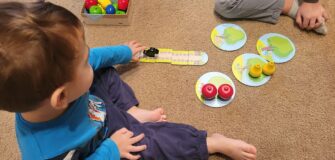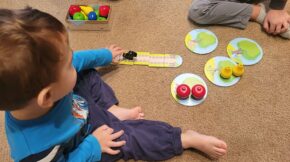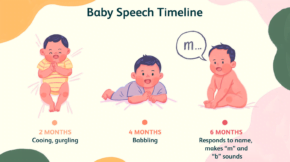How Many Words Should a 18 Month Say: A Complete Guide
Share
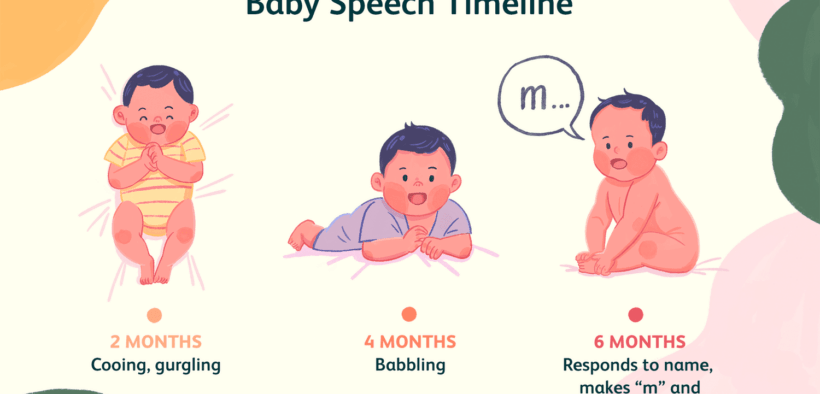
It is difficult for people who have become parents for the first time to tell whether their child displays any signs of delayed psychomotor development. Parents are often curious about the progress of the cognitive, emotional, social, and motor development of their children. Speech-related abnormalities are often ignored in children as they are still in the developmental stage.
The desired word limit is not strictly defined, but there is a range of words that can be referred to by parents, and it is referred to by specialists to track the progress of the psychomotor development of children.
Before we delve into how many words an 18-month-old says, let us first understand what qualifies as a word for a toddler.
What Qualifies as a “Word” for Toddlers?
Toddlers observe and respond according to their surroundings. Sometimes they use specific sounds intentionally to point toward something like water. They also babble unclear words. But when these words and sounds are repeatedly used, people understand what the toddler is trying to communicate. The following points should be considered while examining a child’s speech development, and under the following circumstances, anything used by a toddler would be regarded as a “word”:
- If your child is speaking actual words
- Use of two words together
- If your child is speaking unclear but approximately actual words
- If your child is mimicking animal sounds
- If your child is using exclamatory sounds
Along with the points mentioned above, the following points should also be considered about what qualifies as a “word” for a toddler. The word/sound should have been used by the toddler multiple times (more than three times). The toddler should be using the word/sounds independently. The toddler should use the word/sound in the same context each time, and the context is right.
How Many Words Should an 18-Month-Old Say?
As mentioned earlier, the number of words is not strictly defined, but averages and ranges determine a child’s development progress. There are discrepancies related to these averages and ranges too. According to CDC guidelines, your child must speak three or more other than “mama” and “dada.” Healthline mentions that a child, by the age of 18 months, should know about ten words. Different websites say different numbers of words for an 18-month-old. So it becomes confusing for anyone searching for “how many words should an 18-month say?”
The pace at which a toddler learns words and starts speaking varies greatly based on individual approach and the environment the toddler is growing in! During the initial developmental stages, the pattern and pace of psychomotor development differ from child to child. While some have better vocabulary at 18 months of age, others have better motor skills like walking, running, and climbing with the help of support.
By the time the child goes to school, the overall development has occurred regarding psychomotor skills. Hence, it becomes difficult to label what should be the strength of the vocabulary of an 18-month-old.
Why is There a Discrepancy in Recommendations?
The discrepancy is because of the difference in the manner different organizations and professionals choose to report their recommendations. Health organizations or professionals may report their suggestions in the following way.
- Milestone – milestone refers to what most children can speak at the specified age. The majority meaning more than 90% of children.
- Average – average refers to the average number of words spoken by children of the specified age.
- Range – range refers to a pair of numbers of words spoken by children of the specified age, including the minimum and the maximum number of words. For example, according to “Toddler Talk,” an 18-month-old should be able to speak about 20-200 different words.
What Do You Think Should Be Done in Case of Confusion?

You must consult a professional, such as a pediatrician, to settle this confusion. The pediatrician will evaluate the child’s psychomotor development based on gender, genetics, length of the gestation period, and many other factors.
After the evaluation, the pediatrician will suggest a speech therapist for your child. Speech therapists are professionals who can help your child through guided activities to resolve speech-related issues.
When Do You Think You Should Consult a Pediatrician?
Parents or caregivers can easily track the progress of psychomotor development cues of the child. Although it is not a difficult task, it requires attention. Certain speech-related cues can act as alarming signals for parents or caregivers that their child is facing communication problems. The following points should be taken as a wake-up call to seek professional help.
- Little or no babbling as an infant
- Your child has not spoken the first word yet – usually, a child has spoken the first word by the age of one year (12 months)
- Your child has a limited vocabulary for their age
- Your child has stuttering problems from 18 months onwards
- Your child does not imitate
How is Speech Therapy Useful for Your Child?
Speech therapy helps in the improvement of speech and language-related issues in children. Early detection of speech abnormalities has benefits for the child. Early detection results in early intervention and treatment.
Early treatment of speech disorders will likely show better results as the child is still in the developmental phase. Speech therapy aids in the holistic development of individuals, aiming to improve their quality of speech and overall communication.
Speech therapists or speech-language pathologists are professionals who work in close association with children or adults having speech-related abnormalities.
What is the Role of a Speech Therapist?
The role of a speech therapist is more than just correcting your child’s pronunciation. A speech therapist helps in holistic speech development. A speech therapist generally considers the following aspects when dealing with an individual facing speech and language-related problems.
- Articulation of speech – articulation means the ability to move the tongue and lips to pronounce correctly and talk properly.
- Improving communication – this includes teaching verbal and non-verbal communication.
- Enhancing comprehension of sounds, words, non-verbal gestures, and other cues into meaningful information.
- Development of pragmatic language – use of language to build healthy relations and improve social interaction.
- Building conceptual skills – helps in looking at the bigger picture during grim situations, creative thinking, and strategic planning.
What is Included in Speech Therapy for Children?
A speech therapist may assist the child in the following manner.
- Repetition of words/sounds – the speech therapist will ask your child to repeat certain words by breaking them into parts to make it easier for the child to follow. The child will observe the therapist and repeat the same words/sounds.
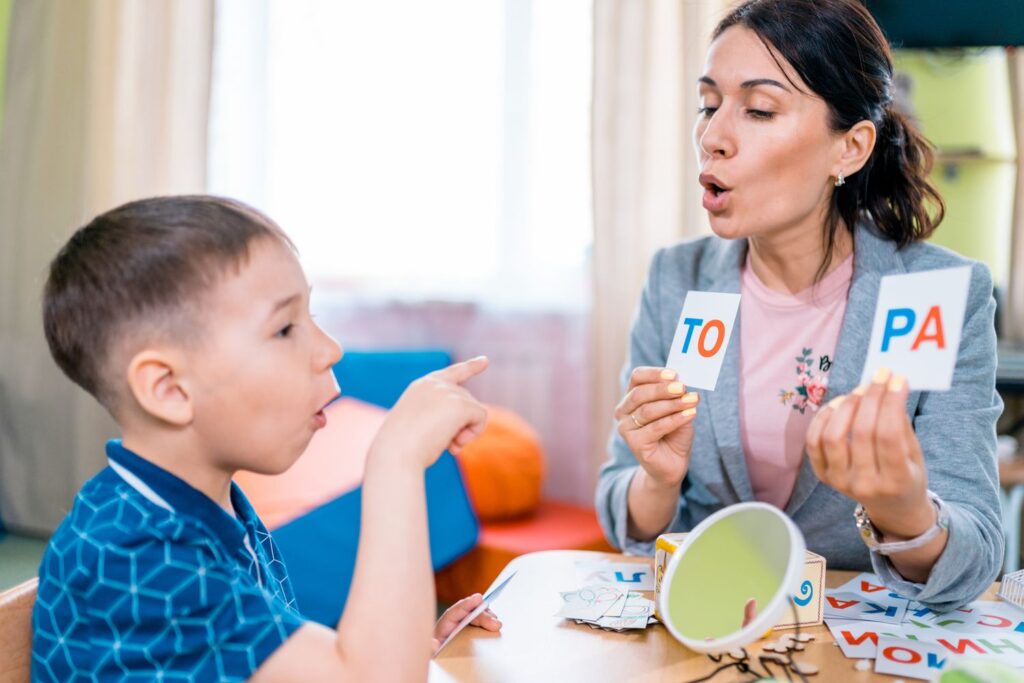
- Use of a mirror – the therapist might ask your child to repeat certain things while looking in the mirror. This makes the activity more fun for the child and boosts confidence.
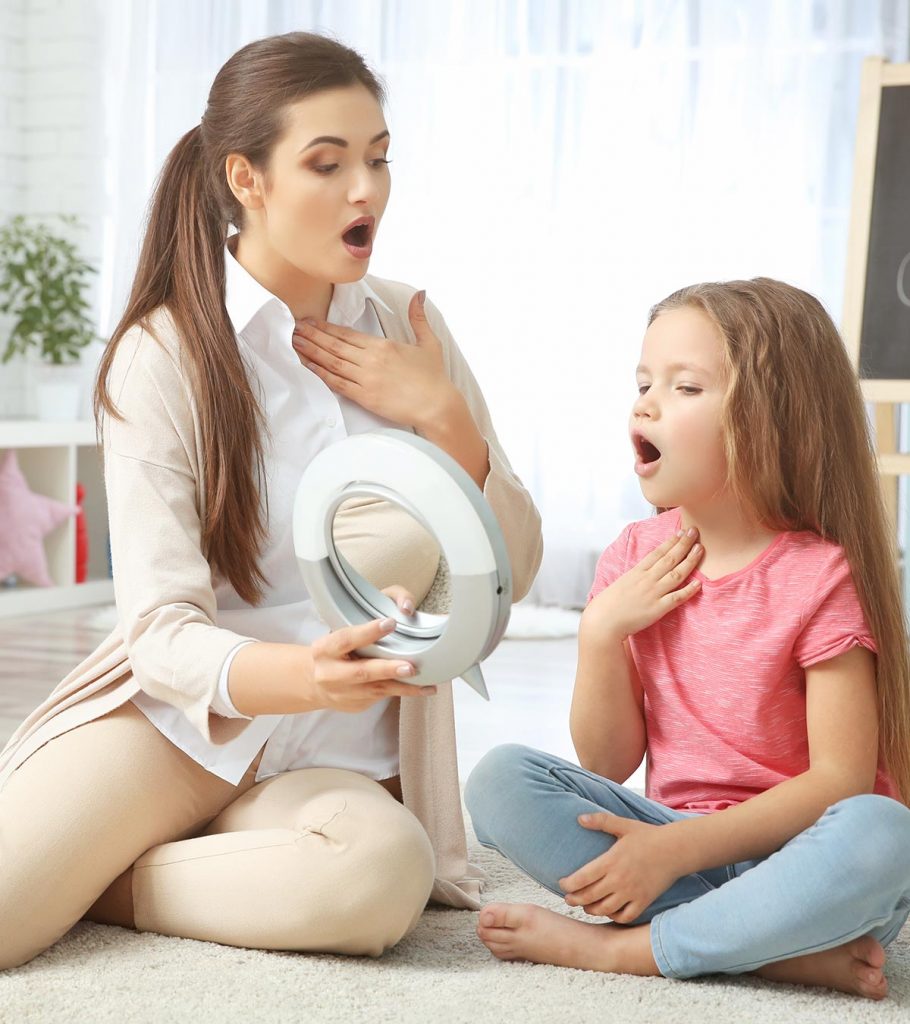
- Use of pictures and cards (PECS training) – PECS stands for Picture Exchange Cards. Pictorial representation of things helps retain better and longer. The speech therapist will use colorful cards to help the child.
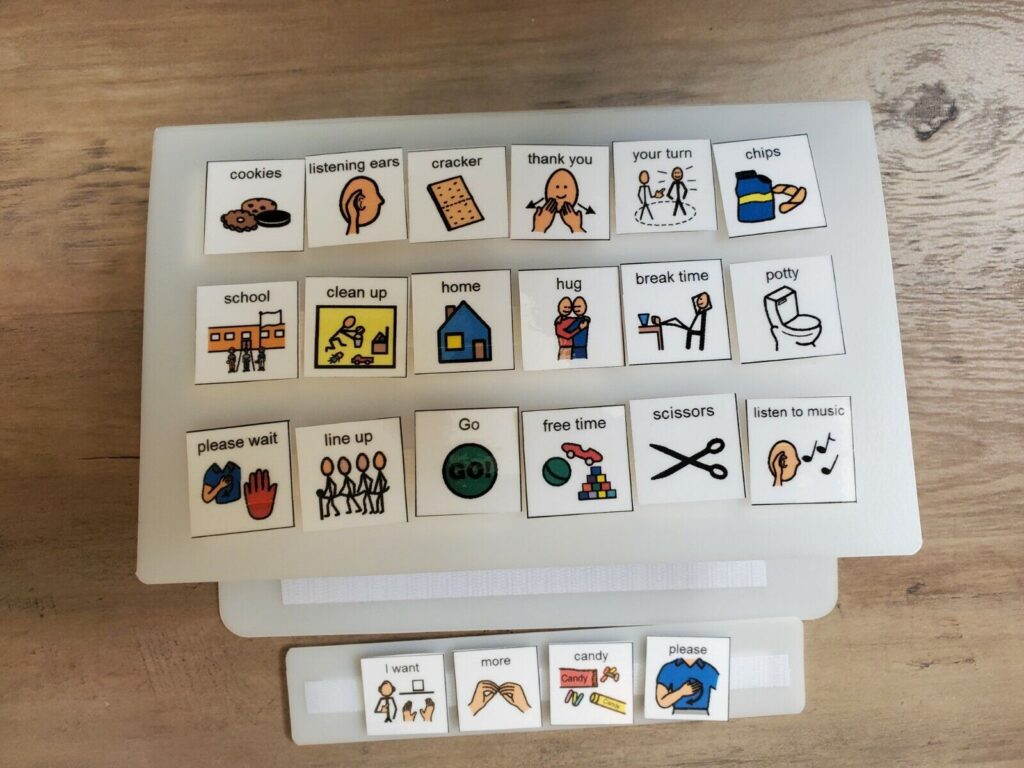
- Using fun games – fun games help get the child’s attention toward the treatment plan. Fun games help in developing interest and aid in better learning.
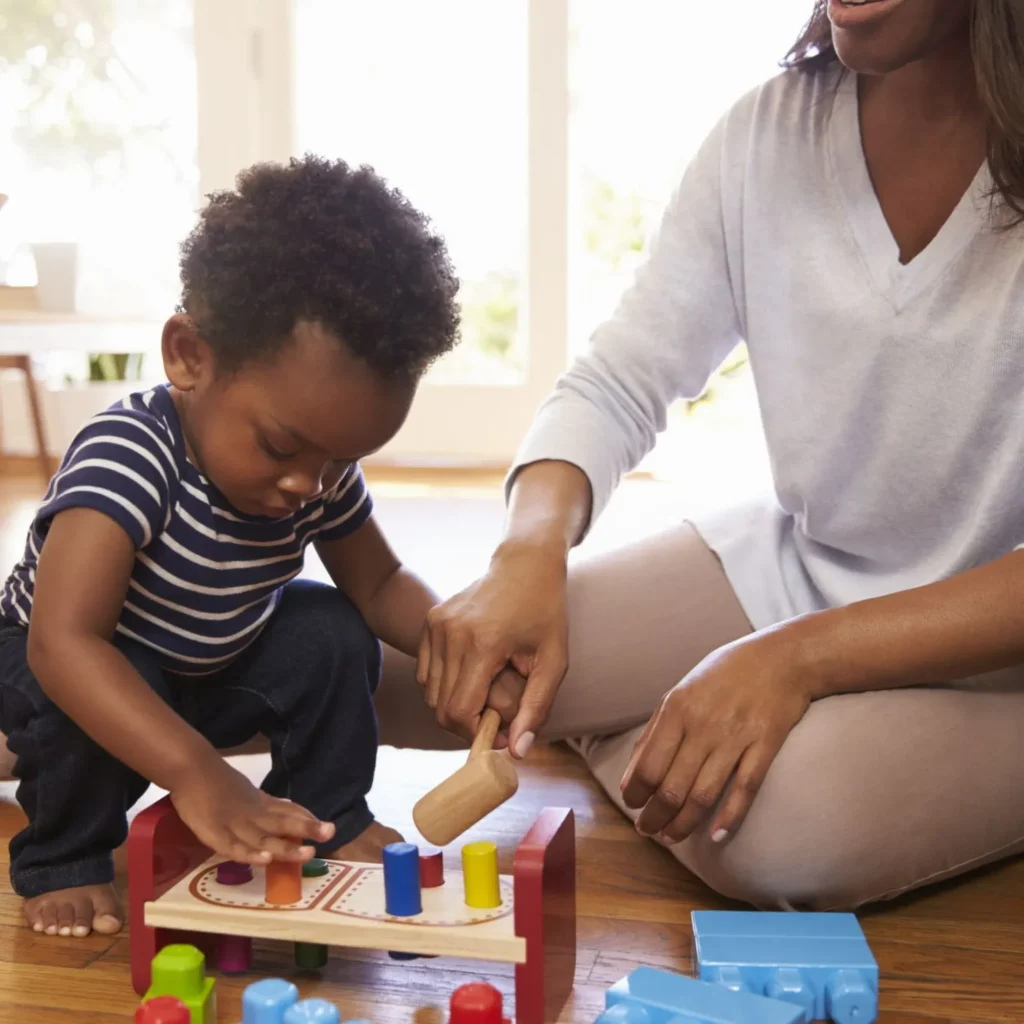
- Giving homework to parents – giving some activities also helps parents continue the therapy at home, as it is a continuous process.

Tips for Parents/ Caregivers to Improve Speech and Language in Their Children
- Don’t use “baby talk” with your child. Baby talk here refers to gibberish, intentional babbling, and distorted pronunciations.
- Have regular conversations with your child.
- Use clear words while talking.
- Use simple words first.
- Use gestures and sounds to reinforce better comprehension.
- Use colorful books and cards for better retention and memory.
- Offer 2-3 choices while asking your child a question, rather than simply putting a question forward.
- Read stories to them before bedtime.
- Correct them if they are mispronouncing a word but have patience till the toddler grasps the correct pronunciation.
- Listen to them carefully, and don’t interrupt them midway.
Conclusion
There is no particular figure to pinpoint the desirable number of words for an 18-month-old child. If you look up on the internet, it will give you varied search results for “how many words should an 18 month say?”.
Please observe your child closely during the initial years of development. The first three years are the most crucial for language and speech development. If you notice some issues related to speech and language, consult a professional like a pediatrician. But it is not something to worry about.
With professional help and consistent efforts, speech-related abnormalities can be overcome. Be patient in the process!
Frequently Asked Questions
Do Boys Start Talking Later than Girls?
In a study conducted by Seyda Özçalskan and Susan Goldin-Meadow in 2010, it was observed that girls start talking before boys. But, it doesn’t mean that boys are late in speech development. They are just a little behind girls. “Girls tend to be on the earlier end, and boys on the later end, of this age range,” Seyda Özçalskan and Susan Goldin-Meadow.
How to Tell if My Child is a Late Talker?
You must observe and track the number of words your child uses. If your child does not speak at least three or more words other than “mama” and “dada” by the time they turn 18 months old, consult a pediatrician.









